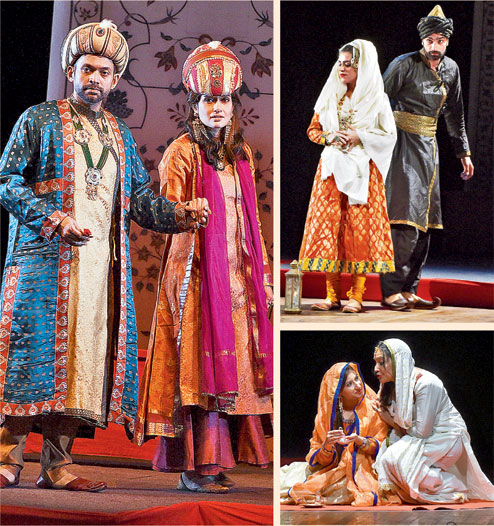
Pictures: Rashbehari Das and B. Halder
It’s often said that Shakespearean plays are not meant to be read, but enacted and watched. Perhaps, the same holds true for history, at least for those who weren’t in love with the subject in school.
So when Delhi-based group Yatrik, helmed by Avijit Dutt, brought the story of Mughal empress Noor Jahan to the Calcutta stage, some characters from the school textbooks took on a life of their own and became unexpectedly absorbing. Here’s what we relearnt from Noor Jahan at GD Birla Sabhagar on July 29, with a new-found interest in the most powerful woman from the Mughal court.
History seems real
The clatter of hooves is audible, the royal dazzle is visible and the courtly drama of love, passion and ambition is palpable as we see the events unfolding through the eyes of Mehrunnissa, who goes on to become Noor Jahan.
Noor Jahan, the free spirit
Daughter of Persian aristrocat Ghias Beg, wife of Ali Quli Khan (also known as Sher Afghan, an army general to the Mughal emperor Akbar), and later married to Mughal sultan Jehangir — Mehrunnissa is not satisfied being identified as any of the above. She craves for an independent identity, outside the control of the men in her life.
The many facets of her
What a modern lady is she, and so multifaceted! She’s a perfumer (she encouraged the manufacture and use of ittar), a designer (she introduced the art of chikankari), an architect, a shrewd military as well as an able administrator. She gets her name minted on coins and encourages women to financially sustain themselves through their work of art.
Fighter with flaws
Just as we start admiring Noor Jahan for not just being another passive member of the emperor’s harem, we also start judging her for the cunning with which she gets rid of a loyal informer or the way she clings to the opium-addicted king to ensure her grip over matters of administration.
But hold on, isn’t she battling it out in a man’s world? Why should she be blamed for Jehangir’s vices and him going astray? How else can she defend her position when almost all the men in court detest the fact that a woman is calling the shots at the Mughal court? Noor Jahan is ambitious. And that’s not a fault.

Sibendu Das
Avijit Dutt, the director of the Delhi-based theatre group Yatrik, and his team conducted a two-hour workshop for theatre enthusiasts at the library of GD Birla Sabhagar on July 31. Highlights...

Meaningless act: The 14-odd participants were asked to perform “meaningless acts”. Why? “To lose your inhibitions,” said the director. If an actor becomes conscious of his or her personality, it is difficult to put up a spirited show.
The ‘Om’ effect: Chanting Om helps one improve one’s voice, an essential element in acting.
Body and vocals: The next demonstration had the participants enact how a machine works through body and voice acting. The participants had to produce vocal sounds as well as move their body in a way to simulate how a machine works. This explains how you can replace props with the human body. This is the basic lesson in body acting.
Improvisation: The participants were divided into groups and each group was told to make a skit representing the emotion of tension. Each group came up with a different way of representing tension and that showed how impromptu improvisation helps in coming up with creative ways of acting.

Text: Sarthak Ganguly
Pictures: Shuvo Roychowdhury










